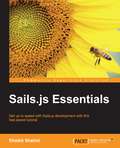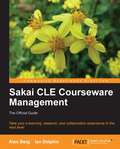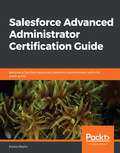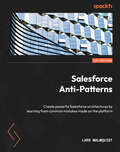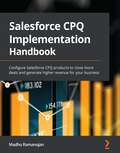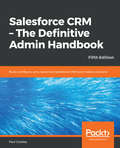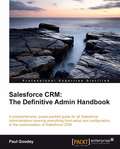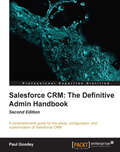- Table View
- List View
Sailing Safe in Cyberspace
by Anjali KaushikSailing Safe in Cyberspace is an excellent resource on safe computing. It gives in-depth exposure to the various ways in which security of information might be compromised, how cybercrime markets work and measures that can be taken to ensure safety at individual and organizational levels. Cyber security is not just a technical subject that can be resolved like any other IT-related problem--it is a 'risk' that can be mitigated by creating awareness and getting the right combination of technology and practices based on careful analysis. This book combines insights on cybersecurity from academic research, media reports, vendor reports, practical consultation and research experience. The first section of the book discusses motivation and types of cybercrimes that can take place. The second lists the major types of threats that users might encounter. The third discusses the impact, trend and role of the government in combating cybercrime. The fourth section of the book tells the readers about ways to protect themselves and secure their data/information stored in computers and the cyberspace. It concludes by offering suggestions for building a secure cyber environment.
Sails.js Essentials
by Shaikh ShahidGet up to speed with Sails.js development with this fast-paced tutorial About This Book * Gain expertise in building web apps with Sails.js * Develop apps such as real-time chat app and more in no time * Helps you understand how MVC framework works in Node.js and how to make it work for you Who This Book Is For This book is for web developers who want to build web apps with Sails.js. Proficiency with JavaScript and Node.js is assumed, as well as familiarity with web development concepts. Familiarity with the MEAN (Mongo, Express, Angular, and Node) stack would be an added advantage. What You Will Learn * Find out to quick-start Sails.js and develop production-ready apps * Understand how to apply the MVC model of software development in Node.js using Sails.js * Discover how to write quality code using Sails.js * Integrate third-party APIs and databases such Mongo and MySQL in Sails.js * Get to know the advantages and importance of the MVC framework in software development In Detail Sails.js makes it easy to build custom, enterprise-grade Node.js apps. It is designed to emulate the familiar MVC pattern of frameworks, but with support for the requirements of modern apps: data-driven APIs with a scalable, service-oriented architecture. This book will provide practical examples to get you started with Sails.js and get you develop production-ready apps in no time. We will take you from a Node.js web server and single threading system to a general MVC architecture. You will then learn to develop applications that you might be already familiar with using Sails.js. Finally, we will show you how to create a chat app and a to-do application, and improve code quality using JSHINT and JSCS. Style and approach This practical and easy-to-follow yet comprehensive guide will help you get to grips with the Sails.js framework. Each topic is explained and placed in context, and for the more inquisitive, there are more details of the concepts used.
Sails.js in Action
by Irl Nathan Michael McNeilSummarySails.js in Action is a comprehensive guide to buildingenterprise-capable web applications using Node and Sails. Written by the creators of the Sails.js framework, this book carefully introduces each concept, technique, and tool with real-world examples and crystal clear explanations.Purchase of the print book includes a free eBook in PDF, Kindle, and ePub formats from Manning Publications.About the TechnologySails makes professional web development a breeze. This instantly familiar MVC framework automatically handles the tedious application boilerplate, so you can concentrate on developing features and creating business value. You get powerful tools for rapid API development, task automation, an ORM, and easy integration with any web, mobile, or IoT frontend. And because you're using Node.js, it's JavaScript all the way down.About the BookSails.js in Action is a comprehensive guide on how to build enterprise-capable web applications. Written by the creators of Sails.js, this book introduces each concept and technique with real-world examples and thorough explanations. As you read, you'll learn to build the backend of a typical web application while you explore real-time programming with WebSockets, security fundamentals, and best practices for building Sails/Node.js apps.What's InsideCreating the backend for a web, mobile, or IoT appReal-time programming with WebSocketsUser management, authentication, and password recoveryUsing Sails to autogenerate REST APIsCustom backend development and third-party API integrations About the ReaderReaders should be comfortable with JavaScript and frontend web development. About the AuthorMike McNeil is the creator of Sails.js. Irl Nathan is the producer of sailsCasts, a series focused on using Sails.Table of ContentsGetting startedFirst stepsUsing static assetsUsing the blueprint APICustom backend codeUsing modelsCustom actionsServer-rendered viewsAuthentication and sessionsPolicies and access controlRefactoringEmbedded data and associationsRatings, followers, and searchRealtime with WebSocketsDeployment, testing, and security
Sakai CLE Courseware Management: The Official Guide
by Ian Dolphin Alan BergThis book takes a step-by-step, practical approach and is filled with examples and illustrations. This book is written for a wide audience that includes teachers, system administrators, and first time developers. It also appeals to the Sakai open source community, potential community members, and decision makers working in education.
Sakai Courseware Management: The Official Guide
by Michael Korcuska Alan Mark BergThe book takes a step-by-step, practical approach and is filled with examples and illustrations. This book is written for a wide audience that includes teachers, system administrators, and first time developers. It will also appeal to the Sakai open source community, potential community members, and education's decision makers.
Sakai OAE Deployment and Management: Open Source Collaboration and Learning for Higher Education
by Max WhitneyThe Sakai Open Academic Environment (OAE) provides a unique collaboration system for university campuses: a social network that helps students discuss class materials, pursue research, communicate with faculty, and discover the risks and benefits of sharing personal information—all in a private, rather than public, forum. This example-driven guide will get you up to speed on various methods used to deploy, customize, and manage OAE, whether you’re an IT specialist in an educational institution, or an academic or instructional technologist.Learn how to work with OAE’s source code to modify key areas such as profiles, courses, permissions, and content. You’ll soon adapt this network to support the culture and needs of your campus.Create research projects and online companions for lecture coursesLearn about the range of OAE’s public and privacy settingsCustomize OAE’s look and feel, including the welcome screen, drop-down menus, and sign-up pagesConnect to a local LDAP to work with accounts and authenticationInstall widgets to extend and customize OAE’s core functionalityIntegrate OAE with a web server and backend databaseGet a checklist for deploying your custom OAE to production
Sales 101: From Finding Leads and Closing Techniques to Retaining Customers and Growing Your Business, an Essential Primer on How to Sell (Adams 101)
by Wendy ConnickLearn the ins and outs of sales techniques with this comprehensive and accessible guide that is the crash course in how to sell anything.Sometimes, it seems like learning a new skill is impossible. But whether you are interested in pursuing a full-times sales career, want to make extra money with sales as a side hustle, or are just looking to turn your hobby into a business, everyone can benefit from knowing how to sell. With Sales 101 you can start selling now. This clear and comprehensive guide is perfect for those who are just starting out in the sales field. Presented with a casual and an easy-to-understand tone, it gives you the information and training you need to get started. Sales 101 teaches the basic sales philosophies and tactics that have been successful for centuries, along with newer, more up-to-date information about using the internet and social media to find leads and increase your customer base. Whether you need guidance in making a presentation or closing a deal to handling rejection or managing your time, Sales 101 shares the best advice and solutions to prepare you for a career in the sales field.
Sales Automation (Beiträge zur empirischen Marketing- und Vertriebsforschung)
by Anne CordtsDieses Buch befasst sich mit den Auswirkungen zunehmender Automatisierung im Vertrieb. Als Konsequenz von Automatisierung nimmt die persönliche Interaktion zwischen Mitarbeiter und Kunde ab, sodass der Vertrieb insgesamt weniger persönlich wird. Anhand dreier Forschungsarbeiten werden in diesem Buch die Auswirkungen von Vertriebsautomatisierung auf die Kundeninteraktion und Kundenbeziehung untersucht und das sich wandelnde Anforderungsprofil von Vertriebsjobs beleuchtet. Die erste Forschungsarbeit befasst sich mit der Fragestellung, inwieweit das persönliche (face-to-face) Kommunikationsformat in der Kundeninteraktion durch virtuelle Kommunikationsformate (bspw. Video Calls) ersetzt werden kann. Die zweite Forschungsarbeit widmet sich KI-generierten synthetischen Stimmen, die in sprachbasierten Automatisierungstechnologien (wie z.B. in virtuellen Sprachassistenten) integriert werden, die zunehmend von Unternehmen im Vertrieb an der Schnittstelle zum Kunden eingesetzt werden. Die dritte Forschungsarbeit identifiziert Entwicklungen und Trends im Hinblick auf das (zukünftige) Anforderungsprofil von Vertriebsjobs.
Sales Enablement: Tools and Techniques for Modern Sales Organization (Business Guides on the Go)
by Dietmar Kilian Peter Mirski Britta LorenzThis book helps in building an optimally designed and customer-oriented sales organization. It places a special emphasis on purchasing decisions and leads to producing a decisive competitive advantage. The focus is on the sales enablement process as a holistic framework concept. It forms the infrastructure that ensures efficient cooperation between all areas of the company. The book explains the alignment of all goals, motivations, thought patterns, actions and campaigns in relation to the needs of the customer. In addition, it shows the most promising methods and approaches and how the practical start of sales enablement can look like. The book is aimed at managers and all who deal with sales strategies.
Sales Presentation Techniques That Really Work
by Stephan SchiffmanSales Guru Stephan Schiffman shows you how to give your presentation the ultimate wow factor.
Sales and Service Digital Transformation: The Arrival of CRM3.0 Era
by Jun YangThis book provides a systematic and comprehensive introduction to CRM3.0 in the digital era, which includes innovation in sales and service theoretical systems, in digital tools and products, in value evaluation systems, and in support systems, combined with cases of enterprises. It elaborates on sales in the digital era from different perspectives such as theoretical systems, business models, value output, and digital tools, as well as how to serve digital innovation and transformation. This book involves lots of charts, combined with cases of industry innovation and transformation of typical enterprises, to provide reference and inspiration for managers and practitioners in business especially who are in demand of digital transformation for enterprises, as well as the readers in business schools.
Salesforce Advanced Administrator Certification Guide: Become a Certified Advanced Salesforce Administrator with this exam guide
by Enrico MurruMaster advanced Salesforce Administration concepts with expert tips, techniques, and mock tests Key Features Learn advanced features to reduce implementation time and enhance your Salesforce administration skills Develop the ability to solve critical issues with a proactive approach and deliver the best solution Explore complex automation with workflows, approvals, process builder, and custom Apex coding Book Description The Salesforce Advanced Administrator certification extends beyond administrator certification, covering advanced platform features and functions such as configuration, automation, security, and customization. Complete with comprehensive coverage of all these topics and exam-oriented questions and mock tests, this Salesforce book will help you earn advanced administrator credentials. You'll start your journey by mastering data access security, monitoring and auditing, and understanding best practices for handling change management and data across organizations. The book then delves into data model management for improving data quality and lets you explore Sales features such as products, schedules, quotes, and forecasting capabilities. As you progress, this book will guide you in working with content management to set up and maintain Salesforce content. You'll also master organizing your files and data using reports and dashboards. Finally, you'll learn how to use a combination of automation tools to solve business problems. By the end of the book, you will have developed the skills required to get your advanced administrator credentials. What you will learn Master data security to monitor your org effectively Explore best practices for handling change management across orgs Extend the capabilities of Salesforce objects using advanced relationships, validation rules, and duplicate management Handle file libraries with Salesforce CRM content Understand ways to deliver the best solutions with Sales and Service Cloud applications Build reports and dashboards to visualize data for better decision making Customize your CRM with process automation features Who this book is for If you've already achieved your Salesforce administrator certification, this book will help you prepare for the Salesforce Advanced Administrator certification. You'll also find this guide useful if you are a Salesforce administrator or developer and want to maximize your administration skills with deeper knowledge of advanced Salesforce declarative features. 1-2 years of experience as a Salesforce administrator or developer is enough to help you to get the most out of the book.
Salesforce Anti-Patterns: Create powerful Salesforce architectures by learning from common mistakes made on the platform
by Lars MalmqvistAvoid implementation failures and technical debt by mitigating anti-patterns in your Salesforce enterprise solutions using expert guidance and proven recommendationsPurchase of the print or Kindle book includes a free eBook PDFKey FeaturesBuild exemplary Salesforce architectures by studying anti-patterns that lead to failing systemsDemonstrate deep architectural principles that you can apply in your Salesforce projectsIdentify common problems in Salesforce architectures and apply better architectural solutionsBook DescriptionSalesforce Anti-Patterns teaches you to spot errors in Salesforce patterns that may seem like a good idea at first but end up costing you dearly. This book will enable Salesforce developers and architects to understand how ingenious Salesforce architectures can be created by studying anti-patterns and solutions to problems that can later lead to serious implementation issues. While there are several books on the market that start with the question, “How do I create great Salesforce architecture?” and proceed to a solution from there, this book instead starts by asking, “What tends to go wrong with Salesforce architectures?” and proceeds to a solution from there.In this book, you'll find out how to identify and mitigate anti-patterns in the technical domains of system architecture, data architecture, and security architecture, along with anti-patterns in the functional domain of solution architecture as well as for integration architecture. You'll also learn about common anti-patterns affecting your Salesforce development process and governance and, finally, how to spot common problems in how architects communicate their solutions.By the end of this Salesforce book, you'll have gained the confidence to architect and communicate solutions on the Salesforce platform while dodging common mistakes.What you will learnCreate a balanced system architecture by identifying common mistakes around on- and off-platform functionality and interfacesAvoid security problems that arise from anti-patterns on the Salesforce platformSpot common data architecture issues and discover intuitive ways to address themAvoid the dual traps of over- and under-customization in your solution architectureExplore common errors made in deployment setups, test strategy, and architecture governanceUnderstand why bad communication patterns are so overlooked in architectureWho this book is forThis book is for Salesforce architects, aspiring architects, developers, consultants, and decision makers who want to start making the right architectural choices or prepare for their journey to CTA. This book helps you gain a professional understanding of Salesforce and its building blocks. It is not code-centric, so you will benefit from both functional and technical experience, but a basic level of platform understanding is required.
Salesforce Architect's Handbook: A Comprehensive End-to-End Solutions Guide
by Dipanker Jyoti James A. HutchersonTake a deep dive into the architectural approach, best practices, and key considerations needed to comprehend, evaluate, and design an efficient, scalable, and sustainable Salesforce-based solution. This book takes a comprehensive look at the seven architectural domains that must be considered when architecting a Salesforce-based solution and equips you to develop the artifacts needed for an end-to-end enterprise architecture blueprint for Salesforce implementation and DevOps.This must-have handbook helps Salesforce professionals implement and manage Salesforce in their organization. You will learn Salesforce architecture: solution architecture, data architecture, security architecture, integration architecture, identity and access management architecture, and strategies that can be used for Salesforce-based mobile applications.In addition to the main architecture concepts, the book also offers industry best practices and the recommended framework for approaching, managing, delivering, and continuously improving a Salesforce solution using its Salesforce Development & Deployment Lifecycle. What You Will LearnGet a detailed overview of the Salesforce multi-tenant, metadata-driven architectural framework and the under-the-hood technology stack that supports SalesforceKnow the seven architecture domains, their intricacies, and the considerations needed within each when designing a Salesforce solutionHave an architectural mindset and the artifacts needed to architect an end-to-end enterprise-level implementation of SalesforceBe familiar with the most common Salesforce products, licenses, AppExchange products, and the key considerations of using out-of-the-box declarative capabilities vs custom programmatic capabilities of SalesforceUnderstand data architecture design considerations that include data modeling in Salesforce, identifying and mitigating large data volume concerns, and the key considerations for data migration and data archiving strategiesUnderstand security architecture considerations related to securing data within Salesforce and the various approaches to allow or restrict sharing and visibility from within SalesforceUnderstand integration architecture considerations that provide an overview of the integration patterns and the integrations solutions that can be used with Salesforce to connect Salesforce with a remote system hosted on-premises, on the cloud, or by third-party solution providersUnderstand identity and access management architectural considerations across the 9 stages of an identity and access management lifecycleBe aware of the strategies available to design mobile solutions with Salesforce and the options available for Salesforce mobile architectureEmploy the principles of the DevOps & Development Lifecycle needed for an ideal state Salesforce implementation Who This Book Is ForProfessionals interested in implementing, optimizing, and architecting Salesforce solutions enterprise-wide; Salesforce implementation (SI) partners needing a detailed playbook for architecting and delivering successful Salesforce solutions; Salesforce admins, developers, and architects looking for a one-stop educational resource to mastering the Salesforce architect domains or those pursuing the Salesforce architecture domain certification exams, including the Salesforce Certified Technical Architect (CTA) board exam
Salesforce B2C Solution Architect's Handbook: Design scalable and cohesive business-to-consumer experiences with Salesforce Customer 360
by Mike KingMaster the skills you need as a Salesforce B2C Solution Architect to design an optimized business-to-consumer (B2C) solution across the Salesforce Customer 360 ecosystem, including B2C Commerce, Service Cloud, and Marketing CloudKey FeaturesCreate a unified view of the customer across Salesforce products and beyondAvoid inefficiencies and costly rework caused by poor architectural designsPrepare for the B2C Solution Architect exam and Salesforce certification with practical scenarios following Salesforce best practicesBook DescriptionA carefully designed Customer 360 solution spanning B2C Commerce, Marketing Cloud, and Service Cloud provides the foundation for a single view of the customer, unique insights, and transformational capabilities. There is currently a huge demand in the marketplace for professionals who understand how to leverage these components together. Salesforce B2C Solution Architect's Handbook will help you understand the integration options and products that help you deliver value for organizations.You'll start by developing a solid understanding of the capabilities of each component in the Customer 360 ecosystem, their data models, and governance. As you progress, you'll explore the role of a B2C solution architect in planning critical requirements and implementation sequences to avoid costly rework. The book will also guide you through the options for integrating products with the Salesforce ecosystem and demonstrate best practices for data modeling across Salesforce products and beyond. Once you have the core knowledge required to be a successful solution architect, you'll learn about tools, techniques, and certification scenarios in preparation for the B2C Solution Architect exam.By the end of this book, you'll have the skills to design scalable, secure, and future-proof solutions supporting your customers' critical business demands.What you will learnExplore key Customer 360 products and their integration optionsChoose the optimum integration architecture to unify data and experiencesArchitect a single view of the customer to support service, marketing, and commercePlan for critical requirements, design decisions, and implementation sequences to avoid sub-optimal solutionsIntegrate Customer 360 solutions into a single-source-of-truth solution such as a master data modelSupport business needs that require functionality from more than one component by orchestrating data and user flowsWho this book is forThis book is for B2C commerce architects, application architects, integration architects, and system architects familiar with one or more products within the Customer 360 suite who want to master B2C solutions. Enterprise architects, Salesforce architects, and CTO teams at Salesforce customer organizations looking to benefit from a unified solution will also find this book helpful. A general understanding of data integration, APIs, and connected systems, along with knowledge of the fundamentals of business-to-consumer (B2C) customer experiences is necessary to get the most out of this book.
Salesforce B2C Solution Architect's Handbook: Design scalable and cohesive business-to-consumer experiences with Salesforce Customer 360
by Mike KingThe ultimate handbook for new and seasoned Salesforce B2C Solution Architects who want to design seamless B2C solutions across the Salesforce Customer 360 ecosystem – including B2C Commerce, Service Cloud, and Marketing CloudKey FeaturesGive your customers a frictionless experience by creating a unified view of all their interactionsGet your architectural design right the first time and avoid costly reworksPrepare for the B2C Solution Architect exam and Salesforce certification with practical scenarios following Salesforce best practicesBook DescriptionThere’s a huge demand on the market for Salesforce professionals who can create a single view of the customer across the Salesforce Customer 360 platform and leverage data into actionable insights. With Salesforce B2C Solution Architect's Handbook, you’ll gain a deeper understanding of the integration options and products that help you deliver value for organizations. While this book will help you prepare for the B2C Solution Architect exam, its true value lies in setting you up for success afterwards. The first few chapters will help you develop a solid understanding of the capabilities of each component in the Customer 360 ecosystem, their data models, and governance. As you progress, you'll explore the role of a B2C solution architect in planning critical requirements and implementation sequences to avoid costly reworks and unnecessary delays. You’ll learn about the available options for integrating products with the Salesforce ecosystem and demonstrate best practices for data modeling across Salesforce products and beyond. Once you’ve mastered the core knowledge, you'll also learn about tools, techniques, and certification scenarios in preparation for the B2C Solution Architect exam. By the end of this book, you’ll have the skills to design scalable, secure, and future-proof solutions supporting critical business demands.What you will learnExplore key Customer 360 products and their integration optionsChoose the optimum integration architecture to unify data and experiencesArchitect a single view of the customer to support service, marketing, and commercePlan for critical requirements, design decisions, and implementation sequences to avoid sub-optimal solutionsIntegrate Customer 360 solutions into a single-source-of-truth solution such as a master data modelSupport business needs that require functionality from more than one component by orchestrating data and user flowsWho this book is forThis book is for professionals in high-level job roles that heavily rely on Salesforce proficiency. It’s primarily written for B2C commerce architects, application architects, integration architects, as well as system architects, enterprise architects, Salesforce architects, and CTO teams looking to benefit from a deeper understanding of this platform. Before you get started, you’ll need a solid understanding of data integration, APIs, and connected systems, along with knowledge of the fundamentals of business-to-consumer (B2C) customer experiences.
Salesforce CPQ Implementation Handbook: Configure Salesforce CPQ products to close more deals and generate higher revenue for your business
by Madhu RamanujanThis book is for business analysts, functional consultants, sales managers, Salesforce architects, and those looking to gain Salesforce CPQ certification. Working knowledge of the Salesforce ecosystem is recommended to get the most out of this book.
Salesforce CRM - The Definitive Admin Handbook - Fourth Edition
by Paul GoodeyLearn how to successfully administer, build, and manage Salesforce CRM and Salesforce mobile solutions using real-world and best practice techniques About This Book • See the latest best practice Salesforce administration principles, gain real-world advice, and understand critical design considerations to set up and customize Salesforce CRM • This is a pragmatic guide to the key functions of customizing and setting up the application for enterprise security, user and data management, process automation, analytics, and mobile features • Step-by-step navigation and descriptions of the features of Salesforce CRM platform and clear guidance on the customization and administration of the application • Identify what is covered to create your own improved study guide for the certified administrator examination Who This Book Is For This book is for administrators who want to develop and strengthen their Salesforce CRM skills in the areas of configuration and system management. Whether you are a new administrator or a more experienced professional, this book will enhance your knowledge and understanding of the features of Salesforce CRM. What You Will Learn • Manage and administer user records and password policies • Configure and control the various organization-wide user interface features in Salesforce CRM • Set up and maintain users, profiles, and permission sets and administer appropriate security and login access mechanisms • Apply organization security • Understand the capabilities of the Salesforce CRM sharing model • Create, delete, and customize fields, page layout, and list views for custom and standard objects • Find out how Apex and Visualforce coding can be used in Salesforce CRM • Implement the mechanisms for data management • Discover the tools to import, update, transfer, and mass delete data In Detail Salesforce CRM's Winter '17 release offers a host of new features for CRM designed to transform your sales and marketing requirements. With this comprehensive guide to implementing Salesforce CRM, administrators of all levels can easily acquire deep knowledge of the platform. The book begins by guiding you through setting up users and the security settings and then progresses to configuration, data management, and data analytics. We swiftly move on to the setting up of organization wide features that affect the look and feel of the application. Process automation and approval mechanisms are covered next, along with the functional areas of Sales Cloud, Service Cloud, Marketing Cloud, and Salesforce Chatter. This book details Salesforce CRM system administration in a practical way and is an invaluable reference for both new administrators and experienced professionals. At the end of the book, techniques to further enhance the system and improve the return on investment Salesforce mobile apps and mobile administration are covered, along with Salesforce Adoption Manager. Every chapter is complete with a section containing example questions of the type that you might encounter in the certification examination. Style and approach This book takes a straightforward, no-nonsense approach to working with the Salesforce CRM platform. Filled with examples and use cases, the book presents the facts along with seasoned advice and real-world examples to ensure you have all the resources you need to become a more informed Salesforce Administrator.
Salesforce CRM - The Definitive Admin Handbook: Build, configure, and customize Salesforce CRM and mobile solutions, 5th Edition
by Paul GoodeyA definitive guide covering all the core concepts necessary to pass the Salesforce Administrator Certification examKey FeaturesUnderstand critical design considerations for setting up Salesforce CRMFacilitate and manage the transition from Salesforce Classic to Lightning ExperienceLearn key functions of application security to manage user profiles and dataBook DescriptionSalesforce’s winter ’19 release offers a host of new features for CRM designed to meet your sales and marketing requirements. With this comprehensive guide to implementing Salesforce CRM, administrators of all levels can easily get a thorough understanding of the platform.This Salesforce handbook begins by guiding you in setting up users and security and then progresses to configuration, data management, and data analytics. You’ll discover process automation and approval mechanisms, while also exploring the functional areas of Sales Cloud, Service Cloud, Marketing Cloud, and Salesforce Chatter. This book covers Salesforce CRM system administration in a practical way, and it’ll serve as an invaluable reference for both new administrators and experienced professionals. Furthermore, you’ll also delve into Salesforce mobile apps and mobile administration, along with Salesforce Adoption Manager. You’ll gain insights into Lightning Experience, Salesforce's new app, and learn how its modern design and sleek interface helps you to build customizable components. Finally, we'll see how the two versions compare and help manage the transition from Salesforce Classic to Lightning Experience. By the end of the book, you will have mastered the techniques to configure and control various user interface features in Salesforce CRM.What you will learnConfigure a variety of user interface features in Salesforce CRMUnderstand the capabilities of the Salesforce CRM sharing modelExplore Einstein Analytics - Salesforce's new wave of advanced reporting Get to grips with the Lightning Process Builder workflowSet up user profiles, security, and login access mechanismsFind out how Apex and Visualforce coding can be used in Salesforce CRMManage the transition from Salesforce Classic to Lightning ExperienceImplement data manipulation features to apply best practices in data managementWho this book is forThis book is for administrators who want to develop and strengthen their Salesforce CRM skills in the areas of configuration and system management. Whether you are a new or experienced professional, this book will enhance your knowledge and understanding of Salesforce CRM features.
Salesforce CRM Admin Cookbook
by Paul GoodeyThis book is written in a Cookbook-style format and provides you with immediately useable recipes that extend the functionality of Salesforce CRM and solves real-world problems encountered within the Salesforce CRM application.The recipes in this Cookbook contain proven, step-by-step instructions along with detailed screenshots.This Cookbook has been designed so that you can read it chapter by chapter, starting with recipes that provide enhancements to the user interface, and finishing with recipes that cover data and systems integration. You can also refer to the list of recipes and choose to access them in no particular order. Either method allows you to rapidly implement solutions in your organization that extend and enhance the functionality of Salesforce CRM for your users.This book is for Salesforce administrators and developers who want to quickly incorporate enhanced functionality and extend the power of Salesforce CRM.Whether you are a Salesforce novice or a more experienced administrator, this book provides practical, step-by-step instructions in the use of hidden features, advanced user interface techniques, and solutions for process automation, plus data and systems integration. Not only are standard Salesforce CRM features covered, such as workflow and approval processes, validation rules, and formula fields, but you will also be exposed to further technologies that include HTML, Javascript, CSS, Apex, and Visualforce.
Salesforce CRM Admin Cookbook.: Solutions to help you implement, configure, and customize your business applications with Salesforce CRM and Lightning Experience
by Paul Goodey Fabrice CathalaKey Features Implement advanced user interface techniques to improve the look and feel of Salesforce CRM. Discover hidden features and hacks that extend standard configuration to provide enhanced functionality and customization. Build real-world process automation using detailed recipes to harness the full power of Salesforce CRM. Book Description Salesforce CRM is a market-leading customer relationship management (CRM) application that is accessed over the internet. This application greatly enhances a company's sales performance, improves customer satisfaction, and provides a robust customer relationship management system for an organization. Salesforce CRM Admin Cookbook, Second Edition enables you to instantly extend and unleash the power of Salesforce CRM and its Lightning Experience framework. It provides clear, comprehensive instructions along with detailed screenshots and code. Whether you are looking for solutions to enhance the core features, such as data management, process automation, data validation, and home page administration, or are looking for ideas on advanced customization techniques, this book will provide you with immediate, practical, and exciting real-world recipes. This book guides you through interesting topics spanning a variety of functional areas. Recipes are provided that allow you to configure, build and extend the capability of Salesforce CRM using the Lightning Experience framework. What you will learn Building home page components and creating custom links to provide additional functionality and improve the Home Tab layout Improving the look and feel of Salesforce CRM with the presentation of graphical elements using advanced user interface techniques Improving the data quality in Salesforce CRM and automatic data capture Implement an approval process to control the way approvals are managed for records in Salesforce CRM Increase productivity using tools and features to provide advanced administration Extend Lightning Experience Record Pages to tailor user interaction experience Create Lightning component to implement Search before Create for customer/person accounts
Salesforce CRM – The Definitive Admin Handbook - Third Edition
by Paul GoodeyThis book is for administrators who want to develop and strengthen their Salesforce CRM skills in the areas of configuration and system management. Whether you are a novice or a more experienced administrator, this book aims to enhance your knowledge and understanding of the Salesforce CRM platform and features.
Salesforce CRM: The Definitive Admin Handbook
by Paul GoodeyA practical guide through which you will discover how to set up and configure the application. Along the way, you will also be presented with solutions and real-life examples on how to further improve and maintain its functionality with clear step-by-step instructions. Being highly organized and compact, this book contains detailed instructions with screenshots, diagrams, and tips that clearly describe how you can administer and configure complex Salesforce CRM functionality with absolute ease. This book is for administrators who want to develop and strengthen their Salesforce CRM skills in the areas of configuration and system management. Whether you are a novice or a more experienced admin, this book aims to enhance your knowledge and understanding of the Salesforce CRM platform. By the end of the book, you will be ready to configure and administer a Salesforce CRM system in a real-world environment which fully supports your business needs.
Salesforce CRM: The Definitive Admin Handbook
by Paul GoodeyA practical guide which will help to discover how to setup and configure the Salesforce CRM application. It offers solutions and practical examples on how to further improve and maintain its functionality with clear systematic instructions. Being highly organized and compact, this book contains detailed instructions with screenshots, diagrams, and tips that clearly describe how you can administer and configure complex Salesforce CRM functionality with absolute ease.This book is for administrators who want to develop and strengthen their Salesforce CRM skills in the areas of configuration and system management. Whether you are a novice or a more experienced admin, this book aims to enhance your knowledge and understanding of the Salesforce CRM platform and by the end of the book, you should be ready to administer Salesforce CRM in a real-world environment.
Salesforce Data Architect Certification Guide: Comprehensive coverage of the Salesforce Data Architect exam content to help you pass on the first attempt
by Aaron AllportLearn data architecture essentials and prepare for the Salesforce Certified Data Architect exam with the help of tips and mock test questionsKey FeaturesLeverage data modelling, Salesforce database design, and techniques for effective data designLearn master data management, Salesforce data management, and how to include considerationsGet to grips with large data volumes, performance tuning, and poor performance mitigation techniquesBook DescriptionThe Salesforce Data Architect is a prerequisite exam for the Application Architect half of the Salesforce Certified Technical Architect credential. This book offers complete, up-to-date coverage of the Salesforce Data Architect exam so you can take it with confidence.The book is written in a clear, succinct way with self-assessment and practice exam questions, covering all the topics necessary to help you pass the exam with ease. You'll understand the theory around Salesforce data modeling, database design, master data management (MDM), Salesforce data management (SDM), and data governance. Additionally, performance considerations associated with large data volumes will be covered. You'll also get to grips with data migration and understand the supporting theory needed to achieve Salesforce Data Architect certification.By the end of this Salesforce book, you'll have covered everything you need to know to pass the Salesforce Data Architect certification exam and have a handy, on-the-job desktop reference guide to re-visit the concepts.What you will learnUnderstand the topics relevant to passing the Salesforce Data Architect examExplore specialist areas, such as large data volumesTest your knowledge with the help of exam-like questionsPick up useful tips and tricks that can be referred to time and againUnderstand the reasons underlying the way Salesforce data management worksDiscover the techniques that are available for loading massive amounts of dataWho this book is forThis book is for both aspiring Salesforce data architects and those already familiar with Salesforce data architecture who want to pass the exam and have a reference guide to revisit the material as part of their day-to-day job. Working knowledge of the Salesforce platform is assumed, alongside a clear understanding of Salesforce architectural concepts.

